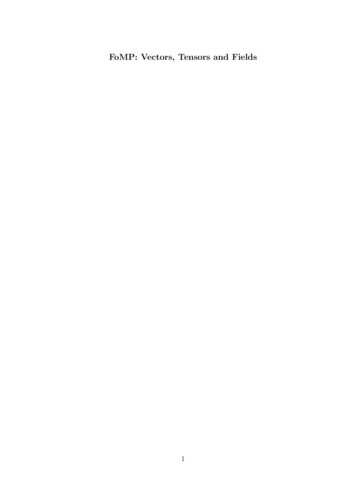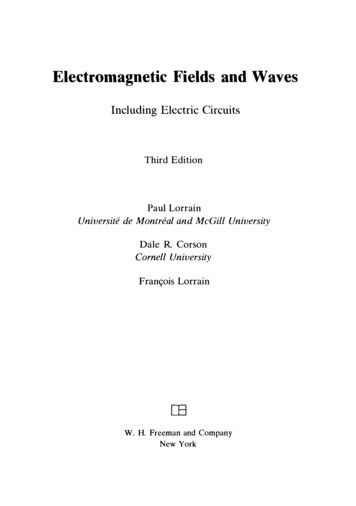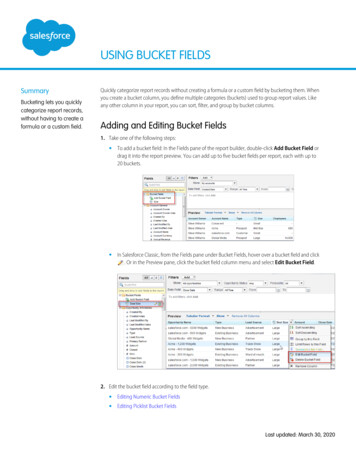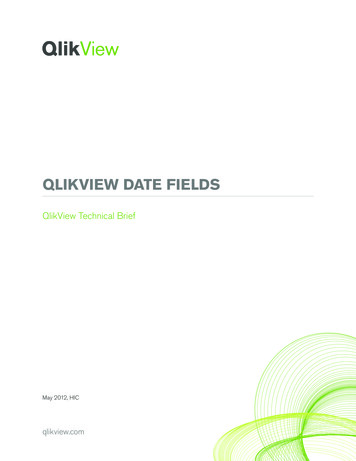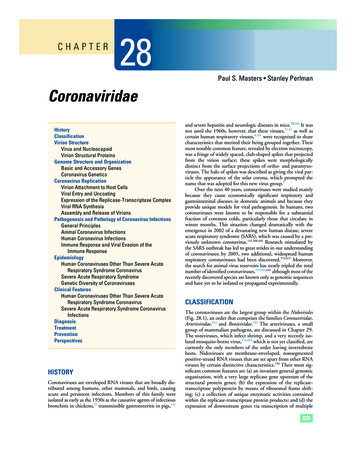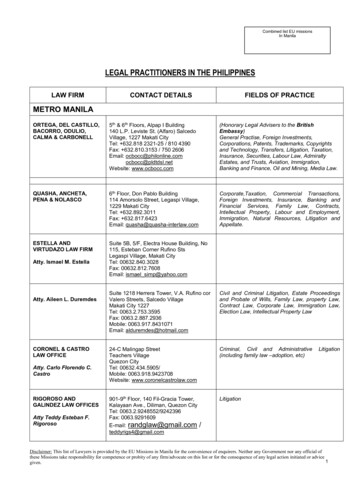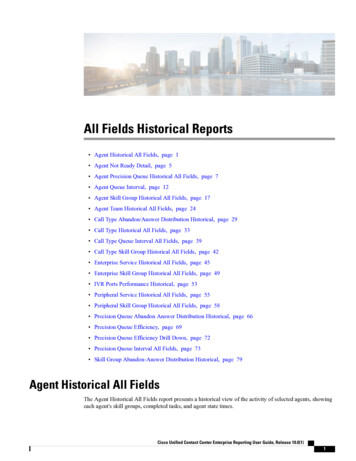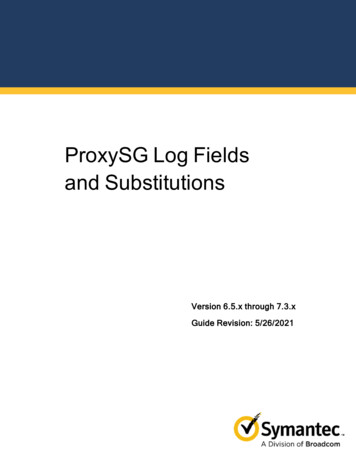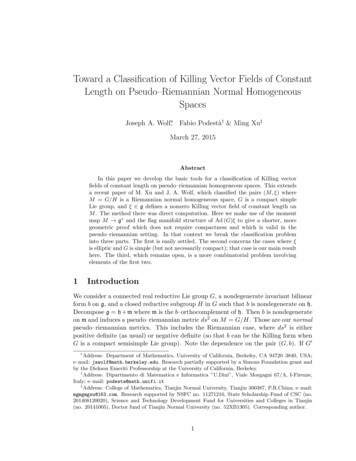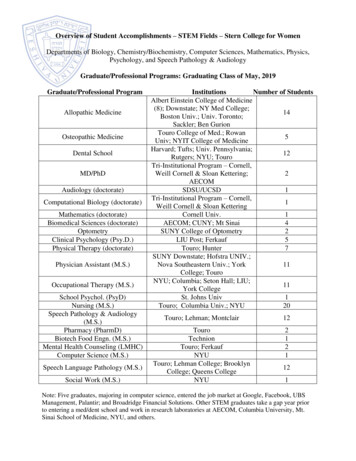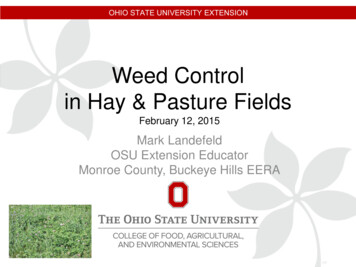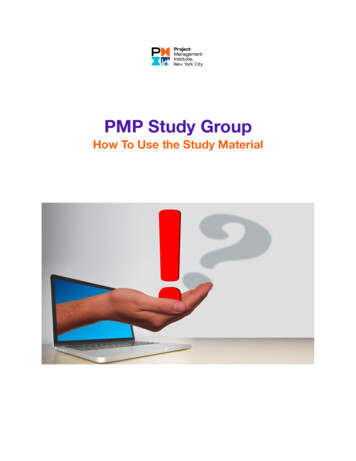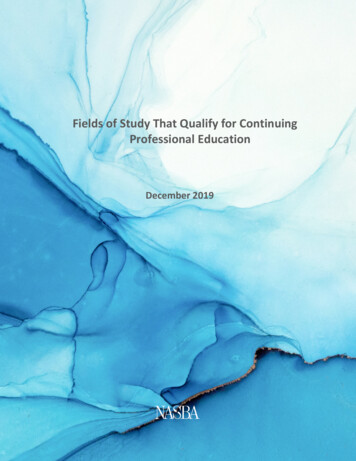
Transcription
Fields of Study That Qualify for ContinuingProfessional EducationDecember 2019
Fields of Study That Qualify for Continuing Professional EducationThe right to use the title Certified Public Accountant (CPA) is regulated in the public interestand imposes a duty on CPAs to maintain public confidence and current knowledge, skills,and abilities in all areas of services. CPAs must accept and fulfill their ethical responsibilitiesto the public and profession, regardless of their fields of employment.A CPA performing professional services needs to have a broad range of knowledge, skills,and abilities. The fundamental purpose of continuing professional education (CPE) is to helpensure that CPAs participate in learning activities that maintain or improve their professionalcompetence. Learning activities that improve a CPA’s professional competence includetechnical and non-technical learning activities.Technical learning activities contribute to the professional competence of a CPA in fields ofstudy that directly relate to the profession of accounting and to the CPA’s field of business.These fields of study include, but are not limited to, the following: Accounting Information Technology Accounting (Governmental) Management Services Auditing Regulatory Ethics Auditing (Governmental) Specialized Knowledge Business Law Statistics Economics Taxes FinanceNon-technical learning activities contribute to the professional competence of a CPA in fieldsof study that indirectly relate to the CPA’s field of business. These fields of study are thosethat do not meet the definition of technical fields of study and include, but are not limited to,the following: Behavioral Ethics Personal Development Business Management & Organization Personnel/Human Resources Communications and Marketing Production Computer Software & ApplicationsWhen approached by a CPA regarding a field of study that does not align to a CPA’s stateboard of accountancy’s accepted fields of study, CPE sponsors have the discretion to re-issuea certificate with an alternative field of study other than those listed herein when necessaryto align to a CPA’s state board of accountancy’s accepted field of study. The CPE sponsor isresponsible for ensuring that the alternate, state-specific fields of study under which thecredits are being awarded reasonably reflect the underlying content of the course.See the next sections for further descriptions of each of the previously identified technicaland non-technical fields of study.1
Accounting – TechnicalThis field of study encompasses the knowledge required to prepare, maintain, or reportthe financial records of an entity; the analysis, verification and reporting of such records;and the principles and procedures of accounting and financial reporting. Subjects relatedto accounting include, but are not limited to, the following: Accounting - General Accounting Research Accounting Services for Small Businesses Financial Statements and Reports - Subjects related to Financial AccountingStandards Board (FASB) statements, concepts, and interpretations as well assubjects related to the International Accounting Standards Board (IASB) suchas the International Financial Reporting Standards (IFRS) Forensic Accounting Measurement, Recognition, and Presentation of Specific Financial StatementItems – Including subjects such as valuation and impairment analyses SEC Practice - Subjects related to accounting and reporting standards, rulesand regulations for publicly held companies Technical Computer Software and Applications – Subjects, especiallyaround enterprise resource planning (ERP) products, that focus on theapplication of software in an accounting practice including applyingaccounting principles in ERP installations and using an accounting softwareproduct to prepare financial reporting documentsAccounting (Governmental) – TechnicalThis field of study encompasses the knowledge required to prepare or maintain thefinancial records of a governmental entity or contract, the analysis, verification andreporting of such records and the principles and procedures of governmental accounting.Subjects related to accounting (governmental) include, but are not limited to, the following: Forensic Accounting related to a governmental entity or contract Governmental Accounting and Reporting - Subjects related to GovernmentalAccounting Standards Board (GASB) standards of state and localgovernmental accounting and financial reporting, statements, concepts, andinterpretations Government Accounting and Reporting Specialized2
Auditing – TechnicalThis field of study encompasses the knowledge required to perform a systematic andindependent examination of data, statements, records, operations, and performances(financial or otherwise) of an entity for a stated purpose. Subjects related to auditinginclude, but are not limited to, the following: Auditing and Reports - Subjects related to auditing standards and procedures Auditing – General Auditing Research Employee Benefit Plan Auditing Forensic Analysis and Evaluation Planning and Supervision Study, Evaluation, Implementation, and Monitoring of Internal Controls Substantive Audit Procedures – Subjects related to activities performed by theauditor (during the substantive testing stage of the audit) that gather evidenceas to the completeness, validity, and/or accuracy of account balances andunderlying classes of transactions Technical Computer Software and Applications – Subjects, especially aroundERP products, that focus on the application of software in an auditing practice,including understanding the issues in auditing ERP system implementations andapplying auditing principles in ERP installations3
Auditing (Governmental) – TechnicalThis field of study encompasses the knowledge required to perform a systematic andindependent examination of data, statements, records, operations, and performances(financial or otherwise) of a governmental entity or contract for a stated purpose. Subjectsrelated to auditing (governmental) include, but are not limited to, the following: Forensic Analysis and Evaluation related to a governmental agency orcontract Government Auditing – General and Specialized - Subjects related toGASB standards of state and local governmental accounting and financialreporting, statements, concepts, and interpretations Government Auditing Standards as required by the GovernmentAccountability Office (GAO)Behavioral Ethics – Non-technicalSubjects related to behavioral ethics include, but are not limited to, the following: Ethical Decision-Making Ethical Practice in Business Personal Ethics Diversity, Equity and Inclusion including unconscious bias training andawarenessBusiness Law – TechnicalThis field of study encompasses the legal system, with special emphasis upon its relationshipto business and the practice of accounting. Subjects related to business law include, butare not limited to, the following: Business Law Collection Law Employment Law Legal and Tax Issues4
Business Management & Organization – Non-technicalThis field of study consists of the management of an organization, including organizationalstructures, management planning, and administrative practices. Subjects related tobusiness management & organization include, but are not limited to, the following: Organization of a Public Accounting Practice Administration of a Public Accounting Practice Time and billing Collections Professional liability insurance Succession planningManagement Planning in IndustryCommunications and Marketing – Non-technicalThis field of study constitutes areas for becoming a competent communicator as well asmarketing tactics for organizations and CPA firms. Subjects related to communications andmarketing include, but are not limited to, the following: Business Presentations Business Writing Interviewing Techniques Public Relations Social Media Customer Communications Marketing Professional Services5
Computer Software & Applications – Non-technicalThis field of study encompasses computer software and applications used by CPAs inperforming professional services. Non-technical courses in this field of study focus on theuse and study of the software itself. This includes, but is not limited to, the following: Courses in the general use of software (“how-to”) around products such asExcel, Word, PowerPoint, and bookkeeping software such as QuickBooks Courses in the architecture and technical aspects of business processsoftware (for example, ERP products)However, some software courses, especially around ERP products, focus on the applicationof the software in an accounting, audit, or tax practice. These courses should becategorized into the field of study of the respective practice: auditing, accounting, ortaxes. These include, but are not limited to, the following: Courses in understanding the issues in auditing ERP system implementations Courses in using tax software for the preparation of tax returns andapplication of tax law and regulations Courses in applying auditing or accounting principles in ERP installations Courses in using an accounting software product to prepare financialreporting documentsEconomics – TechnicalStudies related to the principles of microeconomics, macroeconomics, money and banking,and public finance. Subjects related to economics include, but are not limited to, thefollowing: Economic Growth Employment Theory Fiscal Policy Banking Systems Fundamentals of the International Economy Monetary Policy Pricing Stabilization Supply and Demand6
Finance – TechnicalThis field of study encompasses specific financial management of an organization includingfinancial planning and analysis, asset management, buying and selling businesses,contracting goods and services and foreign operations. Subjects related to finance include,but are not limited to, the following: Asset Management Budgeting and Cost Analysis Contracting for Goods and Services Financial Management Financial Planning and Analysis Quantitative AnalysisInformation Technology – TechnicalThis field of study encompasses subjects related to information technology that include, butare not limited to, the following: Artificial Intelligence Blockchain Cloud Computing Computer Systems Cyber Security Data Analytics Database Management Disaster Recovery Plans Management Information Systems Networking Programming Robotics/Process AutomationWhen a course focuses on the application of information technology in an accounting,auditing or tax practice, the course should be categorized into the field of study of therespective practice: auditing, accounting, or taxes.7
Management Services – TechnicalThis field of study incorporates business processes of an entity, achieving efficiencies,improving cash flow, and maintaining profitability. Subjects related to managementservices include, but are not limited to, the following: Cash and Treasury Management Enterprise Risk Management Performance Management Project ManagementPersonal Development – Non-technicalSubjects related to personal development include, but are not limited to, the following: Career Planning Leadership Time ManagementPersonnel/Human Resources – Non-technicalSubjects related to personnel/human resources include but are not limited to, thefollowing: Functional Areas of Human Resource Management Attracting, Motivating, Developing and Retaining Employees Integration of Functions for an Effective and Efficient Human ResourcesManagement System Diversity, Equity, and Inclusion or Social Justice in Staff Recruitment andRetainmentProduction – Non-technicalThis field of study comprises production management, including scheduling, inventorycontrol, standards for pay and production and quality control. Subjects related toproduction include, but are not limited to, the following: Operations Management Inventory Management Supply Operations8
Regulatory Ethics – TechnicalThis field of study deals with the necessary ethical background knowledge required toadhere to rules and regulations of state licensing bodies, other governmental entities,membership associations and other professional organizations or bodies. Creating anethical framework is absolutely necessary to be able to sort through professional dilemmas.This curriculum covers the needs of licensees in public practice, industry and government.Subjects related to regulatory ethics include, but are not limited to, the following: Business Transactions with Clients Competence Confidential Client Information Conflict of Interest Contingent Fees, Commissions and Other Considerations Discreditable Acts General and Professional Standards Independence Integrity and Objectivity Licenses and Renewals Malpractice Professional Conduct Public Interest and Responsibilities Regulatory Oversight Retention of Client Records State Rules and Regulations9
Specialized Knowledge – TechnicalThis field of study consists of topics that are particular to specialized industries or services,such as not-for-profit organizations, health care, gaming, and oil and gas. [Note:Accounting, auditing, and tax content for these specialized industries should be classifiedas accounting, auditing, or tax.] Subjects related to specialized knowledge include, butare not limited to, the following: Brokers and Dealers in Securities Energy Options on Futures Employee Benefit Plan Auditing Compliance HIPAA Compliance Personal Financial Planning PCI Compliance Valuation ServicesStatistics – TechnicalThis field of study comprises business statistics, quantitative analysis and probability.Subjects related to statistics include, but are not limited to, the following: Analysis of Enumerative Data Analysis of Variance Estimation of Parameters Hypothesis Testing Linear Models Multivariate Probability Distributions Nonparametric Statistics10
Taxes – TechnicalThis field of study encompasses tax compliance and tax planning. Compliance covers taxreturn preparation and review and IRS examina
A CPA performing professional services needs to have a broad range of knowledge, skills, and abilities. The fundamental purpose of continuing professional education (CPE) is to help ensure that CPAs participate in learning activities that maintain or improve their professional competence. Learning activities that a CPA’s professional competence include improve
